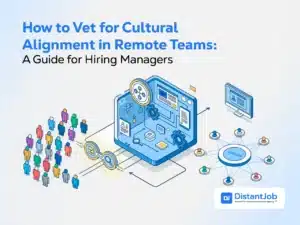Are remote jobs becoming rarer and harder to secure for programmers? The transition to remote work, particularly for programmers aiming to secure full-time remote positions from afar, underscores a paradigm shift in the global workforce, with developers reducing their salary expectations to secure a full-time remote job. According to the Manpower Group, in March 2023, only 13% of job postings were for remote roles, a decline from 17% in March 2022.
For those of you seeking to make your mark as remote programmers in the U.S., the journey begins with a strategic approach to both job hunting and professional development. Embracing remote work requires a mindset shift not only for the individual but also within the company you aim to join.
Drawing from the experience of someone who has navigated remote work for over a decade, several key strategies emerge for you to be hired in the U.S. as a remote programmer.
Start the Conversation Early
If you’re currently in a traditional office setting and dream of shifting to remote work, the first step is to initiate the conversation with your manager. Propose a trial period, such as one remote day per week, backed by solid reasoning on how this arrangement could benefit both you and your team. This approach allows you to demonstrate the productivity gains and potential of remote work, albeit success heavily hinges on your company’s policies towards remote work. Should your employer be resistant to the idea, it may be time to explore new horizons that are more aligned with your remote work aspirations.
Be Selective in Your Job Search
Targeting positions explicitly labeled as remote eliminates any ambiguity and ensures that both parties’ expectations are aligned from the outset. This approach also avoids the pitfall of trying to convert traditionally office-based roles into remote ones—a strategy that often ends in disappointment.
Communicate Your Expectations Clearly
When engaging with recruiters and potential employers, making it clear that relocation or regular office attendance is not an option sets a transparent foundation for further discussions. Moreover, highlighting remote work experience on your resume not only showcases your capability to work independently but also signals to employers your commitment to remote work as a long-term career choice.
Verify the Details of Job Listings
Navigating the remote job market also means being vigilant about the specifics of job listings. Misleading phrases or errors, such as positions advertised as remote due to temporary circumstances like COVID-19, can lead to confusion. So, an eye for details is key here.
Consider Time Zone Challenges
Be mindful of the potential difficulties posed by significant time zone differences between you and the employer, unless flexibility in work hours is explicitly offered.
If you are in a significantly different time zone from the employer, discuss how you plan to manage this challenge. Highlight your ability to work independently, your plan for ensuring timely communication, and how you’ll manage tasks to align with the team’s deadlines.
Clearly determine if the employer expects you to be available during specific hours that align with their time zone. Some roles may require overlap with the company’s core working hours for meetings, collaboration, or customer service.
Highlight Autonomy and Accountability
Employers value remote workers who can manage their time well and deliver results independently. Emphasize your self-discipline, organization skills, and how you hold yourself accountable for your work, which is particularly important when working across time zones.
Leverage Remote-Specific Job Platforms
To maximize opportunities, leveraging remote-specific job boards or specialized agencies in remote recruitment and clearly indicating your preference for remote work on professional profiles can significantly increase visibility among employers looking for remote talent.
This focused approach streamlines the job search process, connecting companies with opportunities that align with your lifestyle and work preferences.
Adapt to the Remote Job Market’s Evolving Dynamics
While the decline in the percentage of remote job postings highlights the competitive nature of the market, opportunities for remote work remain available for those who know how to search for and apply for them effectively. Continuous professional development, networking, and staying informed about industry trends are key to finding success in the remote job market. And if you need help, you can always get in touch with our recruiters, to assist you in the job hunt or easily apply for a job here.




